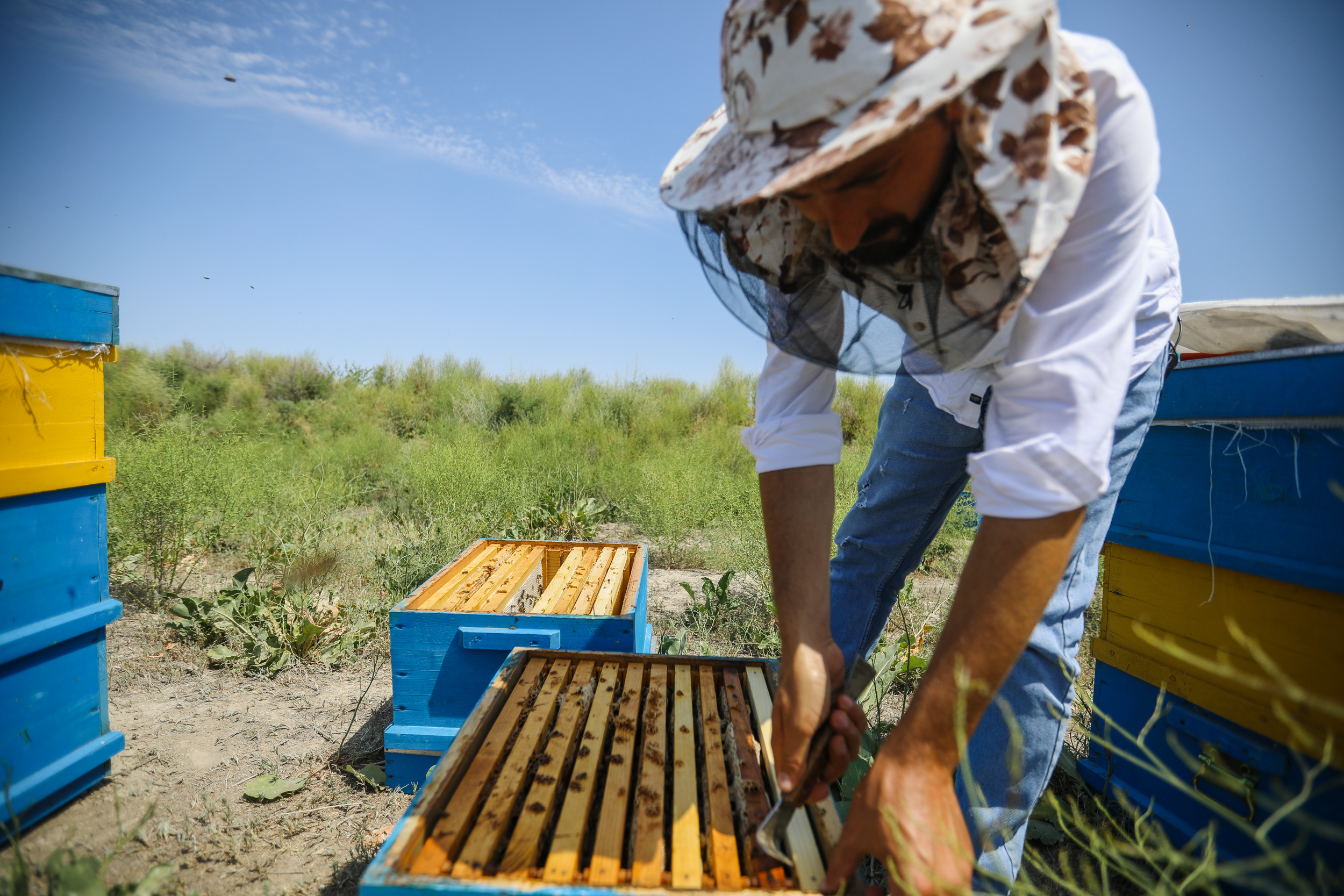Birthday at the bazaar: stories of street vendors in Baku
Street vendors in Baku
The phone ringing woke me up.
— Hello? – I answered with barely an eye open.
“I’m going to stage a protest.” I heard Tofiq’s excited voice at the other end of the phone.
Tofiq is a street vendor, and he often resorts to solitary actions in protest. These are stories told by street vendors in Baku.
- “I was sold for 500 manats” – The fate of transgender people in Azerbaijani prisons
- A story of Azebaijani man who worked at tea plantation to buy a plane ticket and travel the world
- What is it like to work as a waiter in a Baku restaurant? Video
“I don’t resist the police, but bribes”
Tofiq began street trading at the age of nine in the market of his native Astara district; he sold plastic bags to help his family.
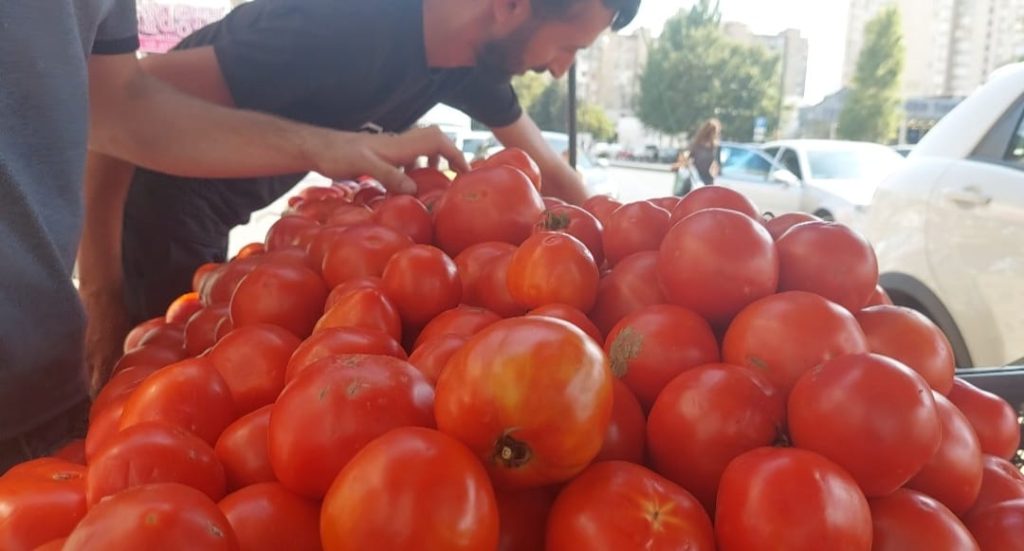
He is now thirty, but the cares of the family are still on his shoulders. He provides for his elderly mother and father, sister and her child with his labor. After his brother was wounded in the second Karabakh war and became unable to work, Tofiq must earn money for his treatment as well.
Tofiq arrived in Baku at the age of 22 in 2014 and immediately began selling in different parts of the capital. The path started at the “green market” of Baku then ran through a variety of streets and metro stations of the city.
He sold near the May 28 metro station in the center of Baku. On his first day there, he received blackberries from the area to sell. Tofiq started selling blackberries just by walking between the rows of people with his hands out.
All the blackberries that could not be sold had to be turned into jam, and he also sold this jam. But according to Tofiq, street vending is harder than making jam.
Now he has his own small counter near the Inshaatchilar metro station. Here he sells seasonal fruits and vegetables. But if he spends four days a week at the counter, he has to spend three days at police stations.
The reason for this situation is that he refuses to pay “tribute” to police officers. And so he is fined, or sentenced to administrative arrest.
In spite of this, Tofiq does not intend to go elsewhere.
“I just want to earn some money to meet the needs of my family. I promised myself that I would not leave.
“Officers of the 29th police department of the Yasamal district demand 70 manats [about $41] in bribes from me per day. And for the small amount I make, this is a large amount for each day.
“If I pay this money, then at the end of the day I will have only 3-4 manats [about $2-3]. I cannot sell low-quality products to customers, or deceive them with the scales. So I said that I would not pay bribes and would stay here,” Tofiq.
He decided to make this issue public, to write on social media about what happened to him.
“They tell me that you are resisting the police. I am not resisting the police, but bribes”.
Tofiq was arrested for the first time in 2019. Police destroyed his counter, and told him he was done selling.
Tofiq protested with a rally near the Inshaatchilar metro station, holding a banner reading “I sell my clothes for 1 manat [about 60 cents].” As a result, Tofiq was detained and by court decision was deprived of liberty for ten days.
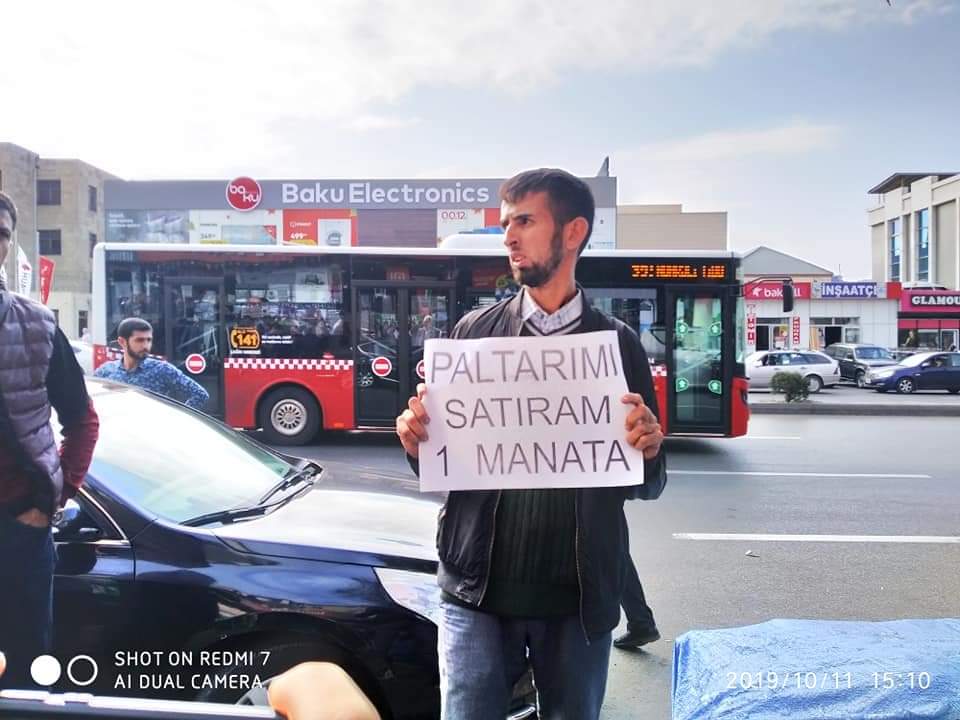
He no longer remembers the number of arrests and fines since that day.
“Street trading is not prohibited by law”
Civil activist and workers’ rights defender Afiaddin Mammadov confidently maintains that street vending is not illegal:
“Any citizen, after obtaining permits, can engage in street vending. It is enough just to register with the tax authorities and notify the relevant department of the chosen place for selling.
“If the department’s response is positive, then you can start selling on the street.”
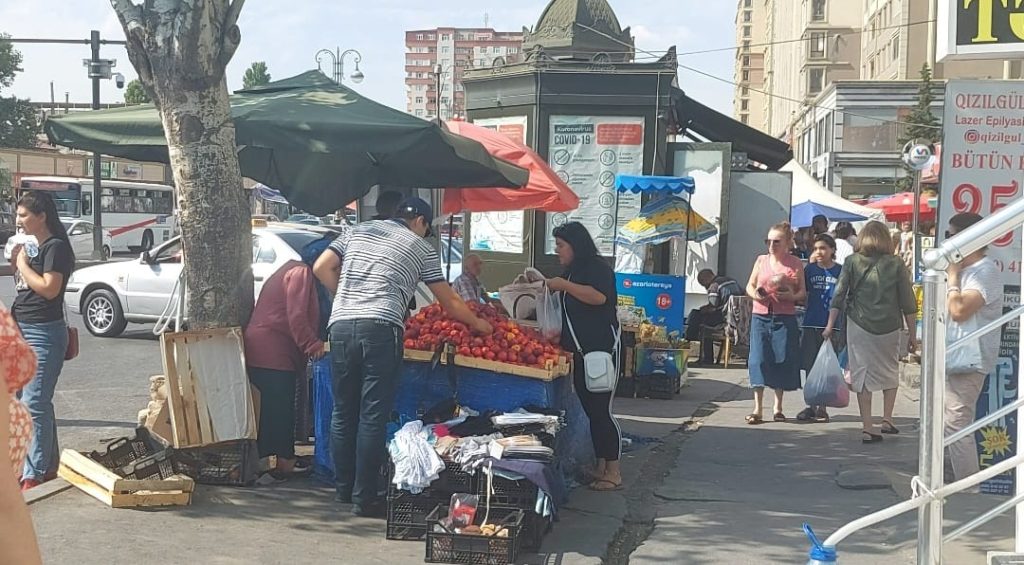
On what basis does the department issue permits?
According to Mammadov, the main factors are the place chosen for selling and the products to be sold:
“The law prohibits street vending on a part of the street intended for pedestrians, in the buildings of state institutions, and near schools or kindergartens. In addition, for the storage of perishable products it is necessary to have special equipment”.
In spite of this, Mammadov says that actually obtaining permits is not so easy:
“Street vending is a big source of bribes and they don’t want to let this go. Thus, very few have official documents. But if you really insist, you can obtain registration with the tax authorities.”
A rare success story and intelligence of journalists
At Ganjlik park in Baku, Elvin sells cotton candy and balloons. He is one of the few who were able to legalize their trade. He pays taxes and is officially engaged in this business. But in order to obtain permission, he had to meet with many officials and go to many offices:
“At first I applied to the executive branch, but they told me that it was none of my business, contact the municipality. But the municipality told me that it was none of their business. This happened several times. Finally I went to the mobile services department.
“There they just kicked me out! I hung around there for days, demanding my street vending rights. They had to agree. Now I pay taxes to the state and do this work.”
In order to personally observe how they handle citizens at the department of mobile commerce, I went there myself in order to “obtain a permit for street vending.”
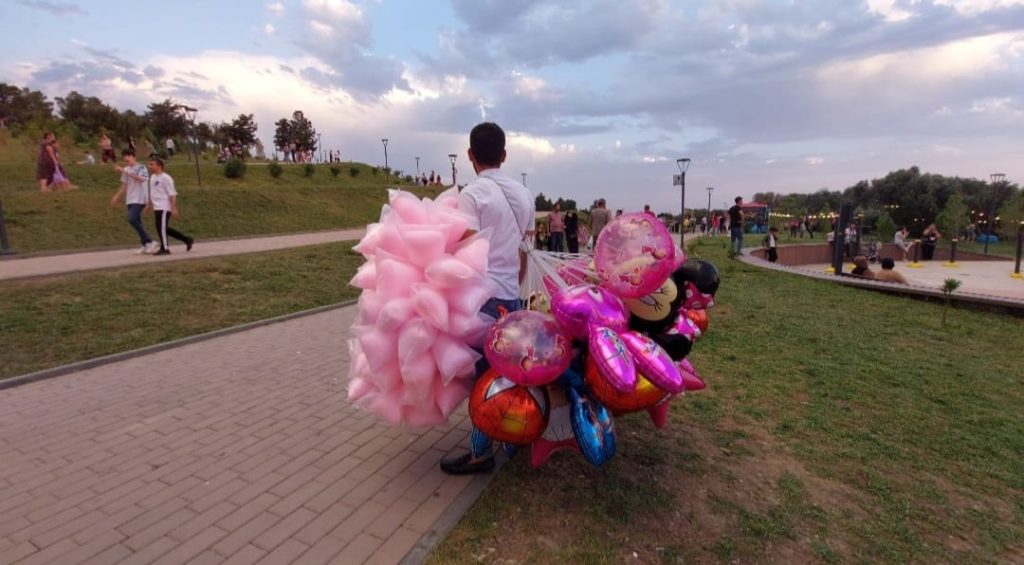
A department of the employee attempted to deal with me at the door, but after my insistence, he invited me into the office.
An official who introduced himself as “Parviz muallim” explained the official registration procedure to me:
“Our employees go to where you intend to sell to determine how many other people are selling there the same products that you are going to sell. There is a limit on the number of sellers of the same product based on the area of the park. They cannot be located next to each other.
“After all this, we contact you and start official procedures. If you are allowed to work, then you pay 90 manats [about $35] of state duty and start working.”
Afterward I submitted a written appeal and asked when they would contact me. They said tomorrow morning – but it’s been more than two weeks and no one has called yet.
Most street vendors in Baku, unlike Elvin, are not even aware of such rules. For example, Sadraddin has been doing this for ten years:
“I try to make money this way. But the park guards and the police won’t let me work. One requires 5 manats [about $3], the other 10 [about $6]. I don’t even know where to turn. Who regulates this, who oversees this matter.”
Is there a legal basis for police intervention?
I ask Sadraddin if the police have ever asked him if he had an official permit for vending. According to him, the police officers do not even ask about it; they just demand money, and when you refuse, you are kicked off the grounds.
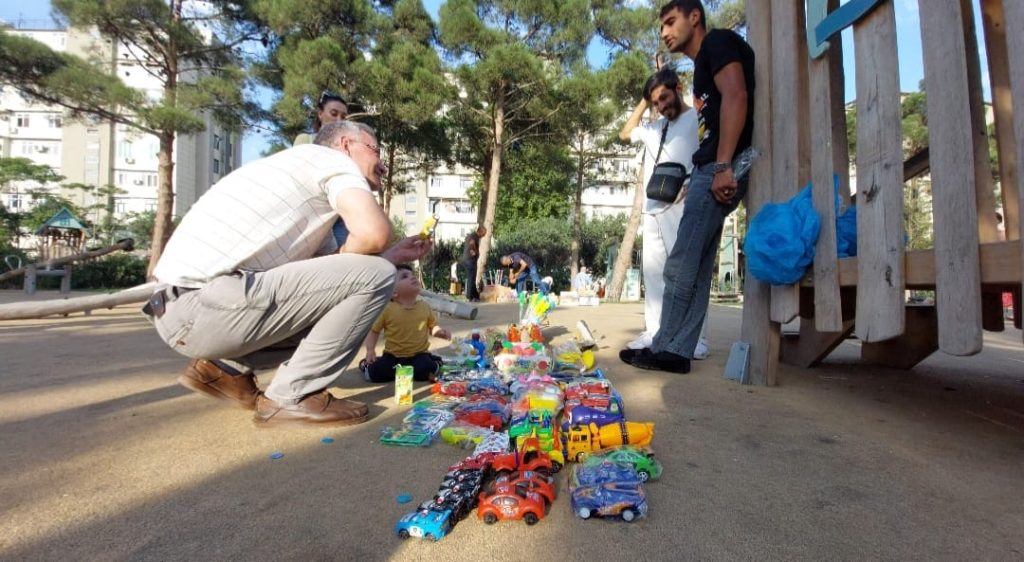
Ministry of Internal Affairs representative Zeini Huseynov says that if street trading interferes with the movement of vehicles and people, then police take control of the situation.
“When identifying people, the police only inform them of having to pursue their activities in specially designated places,” Zeini Huseynov states.
According to Huysenov, illegal police interference in the work of street vendors in Baku and allegations of bribery are totally fictitious.
“Only illegal street trading is prohibited”
Lawyer Yalchyn Imanov said that street trading is not prohibited by law. According to him, only illegal street trading is prohibited.
“According to Article 454 of the Code of Administrative Violations of Azerbaijan, the sale of goods or the provision of services in places not designated for this by the relevant executive power constitutes an administrative offense and leads to administrative responsibility. This article imposes a fine of 80 manats [about $47].
“As can be seen from the requirements of this article, street trading becomes illegal in conditions where places for such activities are not agreed upon with the relevant executive authority.
“In other words, trade in goods or the provision of services in places agreed upon with the relevant executive authority is considered legal and does not create any liability,” Imanov explains.
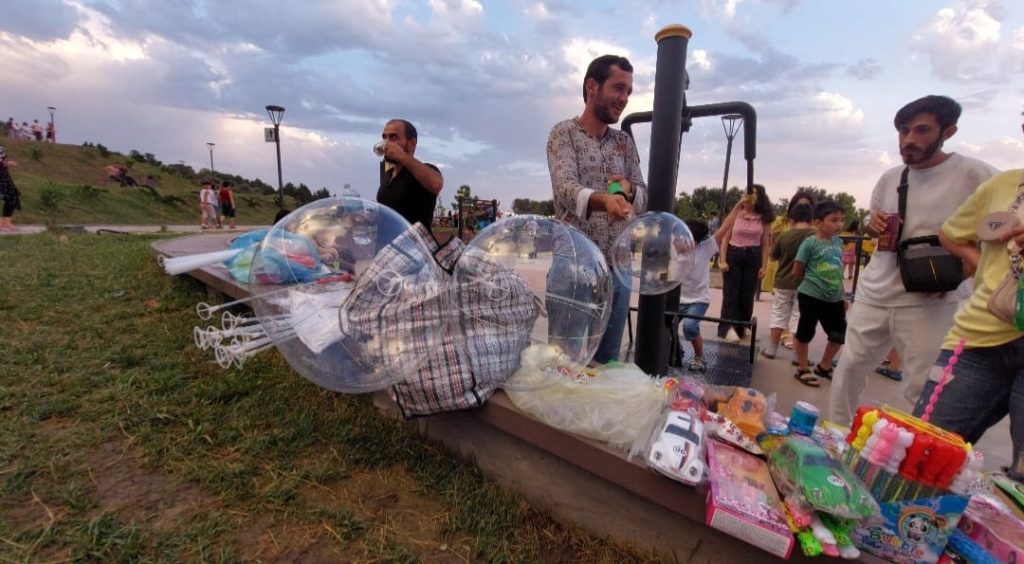
As soon as we meet Tofiq, I find out that today is his birthday.
— Tofiq, I won’t be able to come to the feast. I have to work.
— I’m not going to throw a feast either. I also have to work.
— How would you like to celebrate your birthday?
— Not selling fruits and vegetables behind the counter, but next to your family. But I can’t leave my job. And the products spoil, and I don’t earn enough to take a break.
Street vendors in Baku










